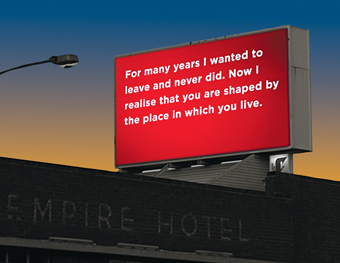the write/here project: signs of the times
judith abell

the write/here project
photo Justy Phillips, James Newitt
the write/here project
I’m walking through my city and I discover that something fundamental has changed. The jangle of multi coloured advertisements, with all of their enticements, have been replaced by personal messages, thoughts and musings. I stop and wonder at the text that I see. I find myself agreeing with “Sometimes you make your own traps” and asking myself what is referred to in “Could be magnificent.” This is the urban experience that Justy Phillips imagined when developing an idea for a short film some years ago.
What evolved from the original idea is a massive public artwork developed in collaboration with fellow artist James Newitt, transforming Hobart for just two weeks.
The write/here project strips 27 bill board spaces around Hobart and re-skins them with pieces of text shown in a white, sans serif font on a lush red background. The text originates from 1000 responses to workshops, exhibitions and individual interviews with residents of Hobart. People were asked a range of questions about the place they live in, including “What does Hobart mean to you?”, “Do you have any regrets?”, and “What are your hopes for the future?” The artists selected the final texts to provide a range of responses that retained enough ambiguity to allow viewers to establish their own interpretations.
While there is only spelling, syncopation and choice of phrase to define their voices, the text is seeded with clues that reveal the contributors as diverse in age, experience and country of origin. One board evokes the sadness of old age, “So many of my friends are dead now”, while another suggests the voice of a prisoner or care home resident: “It’s my own space but sometimes I feel I’m trapped in a cage. 6.30 is too early for goodnight.”
With the spread of boards around the city the write/here project is seen in a range of contexts that have a bearing on both the interpretation and the effect of the text. A poignant note about a highway death at the head of the Southern Outlet is likely to leave motorists pondering their own mortality and “Hobart means home, but you can’t spend your whole life at home” is a prompt for those leaving the airport to think about where they have come from or where they return. There seems to be a tendency toward texts that depict Hobart as something other than a peaceful, picturesque tourist destination and some of my friends have reflected that the overall effect is too melancholy to fit with their impression of their city.
Visually, I enjoy the aesthetic of the boards that use the colours of advertising but are stripped of any extraneous information. The clarity of this effect is pleasing, particularly when seen across a collage of windows, roofs and satellite dishes.
The write/here project is clearly a work mediated by the artists, but their touch is light enough to ensure that it is still an expression of a community. There is a lovely sense of relief in seeing meaningful, truthful statements on these boards rather than wildly exaggerated claims or threats that life won’t be complete without a particular product.
Another account by Judith Abell will appear in Landscape Architect Australia, May 2007
the write/here project, curators Justy Phillips, James Newitt; billboards around Hobart, Ten Days on the Island, March 23-April 1
RealTime issue #78 April-May 2007 pg. web






